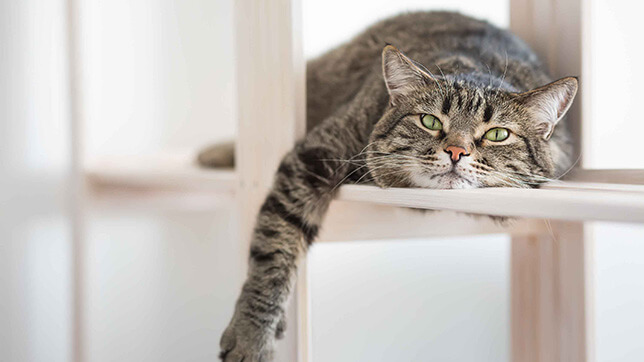20th January 2015
Cats are usually better than dogs at hiding when anything is troubling them, so spotting illness in cats can be quite difficult. Although experts aren’t completely sure why they’re so good at this it is thought to be instinctive, because sick animals are more vulnerable to being hunted in the wild. Bear in mind that your cat’s behaviour may seem normal when they are actually unwell, so be sure to look out for any subtle signs that will tell you more about your pet’s health.
Changes in your cat’s behaviour for no good reason could indicate illness. An independent cat wanting more attention and spending a lot more time with you than usual, or a friendly cat recoiling or running away when you try to stroke them could show that something isn’t right. Lower energy levels in usually active cats need to be made note of, as well as any new behaviour that you haven’t previously noticed such as scratching. Changes in your cat’s routine such as sleeping problems, or if they don’t greet you anymore when you come home are also important signs to consider. There is no guarantee that any of these changes mean your cat is unwell, but if you notice any unusual behaviour then take them to a vet.
Any difference in your cat’s eating or drinking habits suggests illness or dental problems. A cat with a firm routine suddenly refusing to eat demonstrates that something isn’t right. Eating more than usual could indicate an overactive thyroid or diabetes, whilst drinking more or less water could be a sign of diabetes or a kidney infection. Bad breath even when your pet hasn’t just eaten could mean dental problems. Also watch out for your cat vomiting excessively. Occasional vomiting doesn’t necessarily mean your cat is ill, yet if regular vomiting is accompanied by other signs then a vet should be consulted.
Any changes to your cat’s toilet habits also need to be taken into account. It goes without saying that cats are always extremely clean so anything such as missing the litter box is unusual. Behaviour like this could show your cat is stressed and anxious, common with any changes such as moving house or a new baby in the family, but also illness. Note whether your cat is using the litter box more than usual. Any crying or straining could also mean a lower urinary tract disease, and any amount of blood in urine should not be ignored.

If you notice your cat has a higher temperature than normal, it could be because of a fever or something more serious. It is normal for cats to have a slightly higher body temperature than humans at around 100°F but anything a lot higher and you need to consult a vet. Panting for a prolonged period of time is another warning sign, as is your cat walking in an uncoordinated way.
Any changes in weight need to be taken into account too. If your cat appears to weigh a bit more or less than usual, there could be an underlying problem. You should be able to see the waistline of a healthy cat from a bird’s eye view. Also, place your hands on the cat’s back to feel the ribs. Too much protrusion means your pet could be underweight, or they could be overweight if you can’t feel the ribs at all. A cat with a normal weight should not have an overhanging belly, so observe your pet from the side to check this.
Any changes to your cat’s appearance, whether small or not, need to be observed carefully. A dull coat could be due to parasites, skin conditions as well as malnutrition, and excessive shedding could be a sign of stress. Any respiratory abnormalities such as breathing more frequently, harder, or appearing to struggle need to be noted, and discharge from the eyes and nose suggests a bacterial or viral infection. Look for any paleness in or around the eyeballs as this could indicate poor circulation, and your cat’s pupils should not be dilated. If your cat smells different than usual or is making excessive noise, these signs also need to be acknowledged.
Cat owners know their pets extremely well so if you feel like something isn’t right then take them to visit the vet, even if there are no obvious signs of illness. Trust your instincts, as it is always better to check that your cat is healthy.
Insuring your pet gives you peace of mind that you and your pet will be covered if anything were to happen. Here at Animal Friends we have a range of policies for dogs, cats and horses, and we also insure older pets.
Read our cat blog!
If you found this article useful, why not visit our cat blog for more news, insight and opinion pieces?
Need cat insurance?
Cat insurance can help cover the cost of veterinary treatment if your cat gets injured or falls ill.
We know pets
Our pets are part of the family. To achieve our vision of a better future for pets everywhere, we work with our partners, vets, and other veterinary professionals who are pioneering the latest advancements in animal care. Our campaigns, articles, and events are crafted to support, educate, and celebrate pet owners, while our policies are designed to provide peace of mind at an affordable price.
Yet our policies don’t just protect against the unexpected – they have purpose, too.
Since we were founded over 25 years ago, we've provided industry-leading policies that protect the nation’s pets, while also making a difference to animal welfare and our planet. Thanks to you, our policyholders, we've donated over £9 million to more than 830 animal welfare charities and conservancies, helping to support vulnerable pets and wildlife around the world.
We’re proud to be wildly different. Are you?
